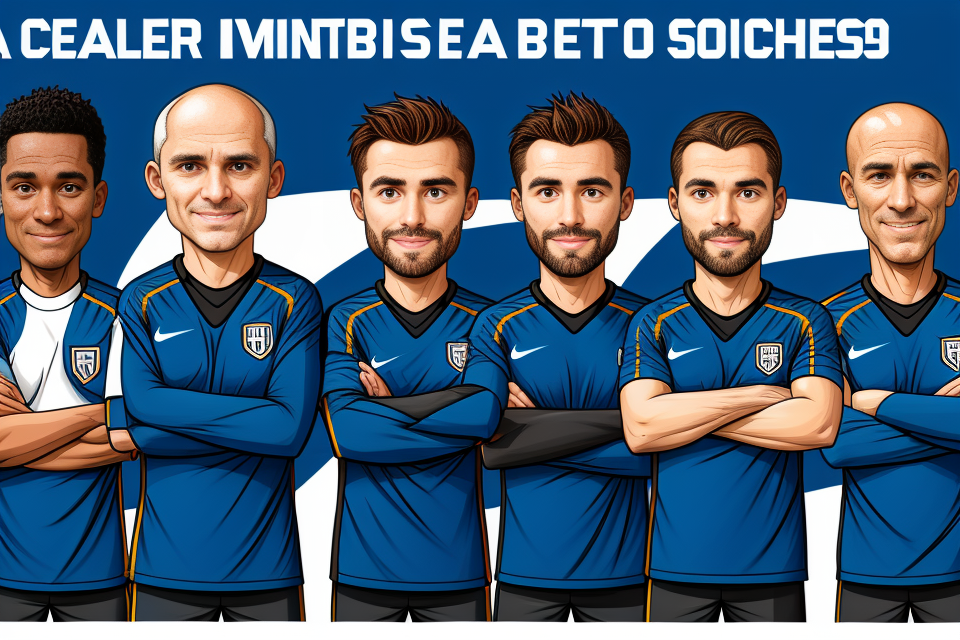Are you passionate about soccer and want to share your knowledge with others? Have you ever considered becoming a soccer coach? Whether you’re a former player or just have a love for the game, coaching soccer can be a rewarding and fulfilling career. However, starting out can be daunting. Where do you begin? What qualifications do you need? How do you build a successful coaching career? This guide will provide you with a comprehensive overview of the steps you need to take to get started in coaching soccer. From gaining qualifications to building your coaching philosophy, we’ll cover everything you need to know to kick-start your career as a soccer coach.
Step 1: Develop Your Knowledge and Skills
Acquire the Necessary Education and Certifications
To become a successful soccer coach, it is essential to acquire the necessary education and certifications. Here are some key steps to consider:
- Formal Education:
- Pursue a degree in sports science, exercise physiology, or a related field to gain a strong foundation in the principles of human movement, anatomy, and exercise science.
- Seek out specialized courses or programs focused on soccer coaching and tactics to deepen your understanding of the sport.
- Professional Certifications:
- Obtain certifications from reputable organizations, such as the United States Soccer Federation (USSF) or the National Soccer Coaches Association of America (NSCAA).
- These certifications demonstrate your competence and commitment to the profession, enhancing your credibility and job prospects.
- Consider pursuing advanced certifications or specializations in areas such as youth coaching, goalkeeping, or sports performance to further differentiate yourself in the job market.
- Continuing Education:
- Stay up-to-date with the latest coaching techniques, tactics, and philosophies by attending workshops, seminars, and conferences.
- Network with other coaches and professionals in the field to learn from their experiences and share knowledge.
- Embrace a growth mindset and be open to feedback, as this will help you continuously improve as a coach and better serve your players.
By investing in your education and certifications, you will be better equipped to provide expert guidance and support to your players, helping them achieve their full potential on and off the field.
Gain Practical Experience
As a soccer coach, it is essential to have practical experience to gain a competitive edge in the field. There are several ways to gain practical experience as a soccer coach, including:
Participate in Internships or Assistant Coaching Positions
Internships or assistant coaching positions are excellent opportunities to gain hands-on experience working with a team and learning from experienced coaches. These positions can provide valuable insights into the day-to-day operations of a soccer team and help develop coaching skills.
Volunteer to Coach Youth Teams or Community Outreach Programs
Volunteering to coach youth teams or community outreach programs is an excellent way to gain experience while giving back to the community. These positions can provide opportunities to work with players of different ages and skill levels, develop coaching skills, and learn new techniques.
Attend Coaching Clinics and Workshops
Attending coaching clinics and workshops is an excellent way to improve coaching skills and stay up-to-date with the latest trends and techniques in soccer coaching. These events can provide opportunities to learn from experienced coaches, network with other coaches, and gain new insights into the sport.
In conclusion, gaining practical experience is a crucial step in starting a career as a soccer coach. Participating in internships or assistant coaching positions, volunteering to coach youth teams or community outreach programs, and attending coaching clinics and workshops are all excellent ways to gain valuable experience and develop essential coaching skills.
Step 2: Build Your Network
Join Professional Associations
Joining professional associations is an excellent way to expand your network and stay up-to-date with the latest trends and best practices in soccer coaching. Here are some of the most reputable associations you should consider joining:
United States Soccer Federation (USSF)
The USSF is the governing body for soccer in the United States, and it offers a range of resources and benefits for coaches at all levels. By becoming a member, you will have access to coaching education courses, networking opportunities, and discounts on products and services.
National Soccer Coaches Association of America (NSCAA)
The NSCAA is a non-profit organization that provides education, resources, and networking opportunities for soccer coaches across the country. As a member, you will have access to coaching courses, workshops, and conferences, as well as a variety of other benefits.
International Coaching Federation (ICF)
The ICF is a global organization that promotes best practices in coaching across a range of sports and disciplines. By becoming a member, you will have access to a range of resources and training programs, as well as the opportunity to connect with other coaches from around the world.
Overall, joining professional associations is a great way to build your network, gain access to valuable resources and training, and stay up-to-date with the latest trends and best practices in soccer coaching.
Utilize Social Media
Social media platforms are an excellent way to connect with other coaches and professionals in the field. By utilizing social media, you can expand your network, learn from others, and share your knowledge and expertise. Here are some ways to effectively utilize social media as a soccer coach:
- Follow influential coaches and organizations in the soccer community on platforms such as Twitter, Instagram, and LinkedIn.
- Join relevant Facebook groups and participate in discussions to engage with other coaches and share your ideas.
- Use LinkedIn to connect with other coaches, professionals, and organizations in the soccer industry.
- Share your thoughts and insights on soccer-related topics through blogs, articles, and podcasts.
- Utilize Instagram to share photos and videos of your training sessions, games, and success stories.
By actively participating in the soccer community on social media, you can build your reputation as a knowledgeable and passionate coach, and establish valuable connections that can help you advance your career.
Step 3: Identify Your Niche
Determine Your Coaching Specialty
When starting your career as a soccer coach, it’s important to identify your niche and determine your coaching specialty. This will help you focus your efforts and build a reputation as an expert in your field. Here are some areas you may want to consider specializing in:
- Youth development: If you enjoy working with young players and helping them develop their skills, you may want to specialize in youth development. This could involve coaching at the U8-U14 age group, and focusing on technical skills, tactical knowledge, and overall love for the game.
- High-performance training: If you have a passion for improving athletes’ physical abilities and helping them reach their full potential, you may want to specialize in high-performance training. This could involve designing strength and conditioning programs, working on speed and agility, and improving players’ endurance and overall fitness.
- Mental and emotional well-being: If you believe that mental and emotional well-being is just as important as physical abilities, you may want to specialize in helping players develop the mental and emotional skills needed to succeed on the field. This could involve working on things like confidence, resilience, and mindfulness, and helping players learn how to manage stress and anxiety.
No matter what area you choose to specialize in, it’s important to remember that coaching is a lifelong learning process. You should always be seeking out new knowledge and skills, and be open to learning from others in the field.
Tailor Your Brand and Marketing Efforts
- Create a personal brand that aligns with your coaching philosophy and values
- Your personal brand should reflect your unique coaching style and the values that you want to instill in your players.
- This could include your coaching philosophy, your playing style, and your communication style.
- Consider what sets you apart from other coaches and how you can use this to your advantage.
- Develop a strong online presence through a professional website and social media profiles
- A professional website is a great way to showcase your coaching services and connect with potential clients.
- Your website should include information about your coaching qualifications, your coaching philosophy, and your availability for private lessons or team coaching.
- Social media profiles can also be a valuable tool for promoting your coaching services and connecting with other coaches and players.
- Consider using platforms like LinkedIn, Twitter, and Instagram to share your coaching insights and connect with others in the soccer community.
Step 4: Develop Your Coaching Philosophy
Define Your Core Values
As a soccer coach, it is important to define your core values as they will serve as the foundation of your coaching philosophy. Your core values are the principles that are most important to you as a coach and will shape your coaching style and approach to the game. To define your core values, consider the following steps:
- Reflect on your personal experiences: Think about your own experiences as a player and what you value most in a coach. Consider what you appreciate in a coach and what you believe sets a great coach apart from a mediocre one.
- Identify your coaching goals: What do you hope to achieve as a coach? What do you want to instill in your players? What kind of team culture do you want to create? Your coaching goals will help you determine what is most important to you as a coach.
- Determine your coaching style: Your coaching style should reflect your values and beliefs. Consider what kind of coach you want to be and what kind of players you want to coach. Do you want to be a coach who emphasizes technical skills or tactical knowledge? Do you want to be a coach who emphasizes teamwork or individual excellence?
- Seek feedback from others: Seek feedback from players, parents, and other coaches to gain a better understanding of what they value in a coach. This feedback can help you refine your coaching philosophy and determine what is most important to you as a coach.
By defining your core values, you will be able to develop a coaching philosophy that is authentic and reflects your unique approach to the game. This will help you create a positive team culture and set the foundation for a successful coaching career.
Create a Holistic Approach
A holistic approach to coaching soccer involves focusing on the physical, mental, and emotional development of the players. This comprehensive method allows for the creation of well-rounded athletes who can excel on and off the field. Here are some key components of a holistic coaching philosophy:
- Emphasize physical development: As a soccer coach, it’s essential to ensure that your players are physically fit and have the necessary skills to excel on the field. This includes developing strength, endurance, agility, and speed through a combination of strength training, cardiovascular exercises, and specialized soccer drills.
- Encourage mental growth: A crucial aspect of a holistic approach is fostering mental resilience and growth in your players. This can be achieved by helping them develop a growth mindset, teaching them how to handle setbacks and failures, and encouraging them to learn from their mistakes. Additionally, it’s essential to promote positive self-talk and visualization techniques to enhance their mental toughness.
- Prioritize emotional well-being: The emotional well-being of your players is a vital component of a holistic approach. As a coach, you should create a supportive and inclusive environment that encourages open communication, teamwork, and collaboration. It’s also essential to help your players develop healthy coping mechanisms for managing stress, anxiety, and other emotions that may arise during competition.
- Establish a positive learning environment: A positive and supportive learning environment is crucial for fostering growth and development in your players. This includes creating a culture of respect, trust, and mutual support among team members. By encouraging open communication and constructive feedback, you can help your players feel comfortable sharing their ideas, concerns, and goals with you and their teammates.
- Promote long-term athlete development: A holistic approach to coaching soccer also involves considering the long-term development of your players. This means taking into account their physical, mental, and emotional growth over time and adapting your coaching strategies accordingly. By focusing on the overall development of your players, you can help them achieve their full potential as soccer athletes and individuals.
Step 5: Build Your Coaching Toolkit
Develop Training Programs
When it comes to developing training programs for your soccer team, there are a few key things to keep in mind. First and foremost, it’s important to design training sessions that are tailored to the needs of your athletes. This means taking into account factors such as their skill level, age, and position on the field.
One way to do this is to assess each player individually and identify areas where they need improvement. For example, if a player is struggling with ball control, you might design drills that focus on dribbling and passing. Similarly, if a player is particularly strong in one area, you might focus on building on their strengths and helping them develop their weaker skills.
Another important aspect of developing training programs is incorporating a variety of drills and exercises to improve different aspects of the game. This might include agility drills to improve footwork, passing exercises to build teamwork, and shooting drills to improve accuracy. It’s also important to mix things up and keep the players engaged, so consider incorporating small-sided games or scrimmages to simulate match situations.
When designing your training programs, it’s important to be realistic about the time and resources you have available. Consider the schedule of your players and plan your training sessions accordingly. Additionally, make sure to include plenty of rest and recovery time in your program to avoid injury and fatigue.
Overall, developing effective training programs is a crucial part of being a successful soccer coach. By tailoring your sessions to the needs of your players and incorporating a variety of drills and exercises, you can help your team improve their skills and achieve their goals on the field.
Utilize Technology
- Video analysis
- Utilize video analysis software to review performances and provide feedback to players.
- Analyze player movements, ball possession, and tactics to identify areas for improvement.
- Create customized training plans based on individual player needs.
- Online resources and tools
- Utilize online coaching courses and certifications to enhance your knowledge and credibility as a coach.
- Join online coaching communities and forums to network and learn from other coaches.
- Use social media platforms to share coaching tips and insights, and to promote your coaching services.
By utilizing technology, soccer coaches can enhance their coaching skills, analyze player performance, and create customized training plans. Online resources and tools such as coaching courses and certifications, online communities, and social media platforms can also help coaches network and promote their services.
Step 6: Establish Your Coaching Business
Create a Business Plan
- Determine your target market and revenue streams
When creating a business plan, it’s essential to identify your target market and potential revenue streams. Your target market will likely consist of parents of young soccer players, youth soccer clubs, and possibly high school or college teams. It’s crucial to consider the needs of each group and tailor your services accordingly.
Revenue streams can come from various sources, including:
- One-on-one coaching sessions
- Group coaching sessions
- Clinics and camps
- Consulting services
- Online coaching services
By determining your target market and potential revenue streams, you can develop a more comprehensive business plan that outlines your goals, target audience, and how you plan to achieve success.
- Develop a marketing strategy to attract clients
Once you’ve identified your target market and potential revenue streams, it’s time to develop a marketing strategy to attract clients. This can include creating a website, social media accounts, and promoting your services through local soccer clubs and organizations.
Networking is also crucial in the soccer coaching industry, so make sure to attend coaching conferences and events to connect with other coaches and potential clients. Additionally, consider offering discounts or promotions to attract new clients and build a strong reputation in your community.
In summary, creating a business plan is an essential step in establishing your coaching business. By identifying your target market and potential revenue streams, you can develop a comprehensive plan that outlines your goals and how you plan to achieve success. Additionally, by developing a strong marketing strategy, you can attract clients and build a successful coaching business.
Set Up Your Business
As you embark on your journey to become a successful soccer coach, one of the essential steps is to establish your coaching business. This section will guide you through the process of setting up your business, including registering your business, obtaining necessary licenses and permits, and developing a pricing structure and billing system.
Register Your Business
The first step in setting up your coaching business is to register your business. Depending on the country or state where you plan to operate, there may be different registration requirements. It is crucial to research and understand the legal requirements for registering a business in your area.
Typically, you will need to choose a business name, register the name with the appropriate authorities, and obtain any necessary business licenses and permits. You may also need to register for a tax identification number and obtain insurance coverage.
Obtain Necessary Licenses and Permits
In addition to registering your business, you may also need to obtain various licenses and permits to operate your coaching business legally. The specific licenses and permits required will depend on your location and the services you plan to offer.
For example, you may need a coaching license from a national soccer association, such as the United States Soccer Federation (USSF), or a coaching certification from a recognized organization, such as the National Association of Soccer Coaches (NSCA).
Additionally, you may need to obtain permits to use fields or facilities for your training sessions or games. It is essential to research and understand the requirements for obtaining these licenses and permits.
Develop a Pricing Structure and Billing System
Once you have registered your business and obtained the necessary licenses and permits, you will need to develop a pricing structure and billing system for your coaching services.
When determining your pricing structure, consider factors such as your experience, the level of service you provide, and the demand for your services in your area. You may choose to charge an hourly rate, a flat fee for a training session or package of sessions, or a combination of both.
In addition to determining your pricing structure, you will also need to develop a billing system to invoice your clients and collect payment for your services. This may include creating invoices, setting up a payment system, and tracking client payments.
By following these steps, you can establish your coaching business and set yourself up for success as a soccer coach.
Succeed as a Soccer Coach
Continuously improve your skills and knowledge
- Seek out professional development opportunities such as workshops, seminars, and certifications to enhance your coaching abilities.
- Read books and articles on soccer coaching and strategy to stay informed about the latest techniques and methodologies.
- Network with other coaches and mentors to learn from their experiences and gain new insights.
Build strong relationships with your clients and athletes
- Communicate clearly and consistently with your clients to establish trust and mutual understanding.
- Tailor your coaching style to the individual needs and goals of each athlete.
- Foster a positive and supportive team environment that encourages growth and development.
Stay up-to-date with the latest trends and innovations in the field
- Follow industry leaders and influencers on social media to stay informed about new developments and trends.
- Attend conferences and events to network with other coaches and learn about the latest innovations in the field.
- Be open to trying new techniques and approaches to improve your coaching skills and stay ahead of the curve.
FAQs
1. What qualifications do I need to become a soccer coach?
To become a soccer coach, you typically need a strong knowledge of the game and experience playing at a high level. You may also need to obtain coaching certifications from organizations such as the United States Soccer Federation (USSF) or the National Soccer Coaches Association of America (NSCAA). Additionally, having a college degree in sports science, kinesiology, or a related field can be beneficial.
2. How do I find opportunities to coach soccer?
There are many ways to find opportunities to coach soccer. You can start by reaching out to local youth soccer clubs and organizations to inquire about coaching positions. You can also consider starting your own soccer team or coaching at the high school or college level. Networking with other coaches and attending coaching clinics and workshops can also help you find opportunities to coach.
3. What should I expect in my first season as a soccer coach?
In your first season as a soccer coach, you can expect to spend a lot of time preparing for games and practices, as well as getting to know your players and their individual strengths and weaknesses. You will also need to develop a coaching philosophy and establish goals for your team. It’s important to be patient and flexible, as you will likely encounter challenges and obstacles throughout the season.
4. How do I build a successful soccer team?
Building a successful soccer team requires a combination of factors, including a strong work ethic, effective communication, and a clear coaching philosophy. It’s important to establish goals and expectations for your team, and to create a positive and supportive team culture. You should also focus on developing individual players and helping them reach their full potential.
5. What are some common mistakes to avoid as a soccer coach?
Some common mistakes to avoid as a soccer coach include being too critical of players, not providing clear instructions or feedback, and not giving players enough opportunities to develop their skills. It’s also important to avoid being overly focused on winning at all costs, and to prioritize the development of individual players and the team as a whole. Finally, it’s important to stay organized and plan ahead to avoid last-minute mistakes or misunderstandings.



